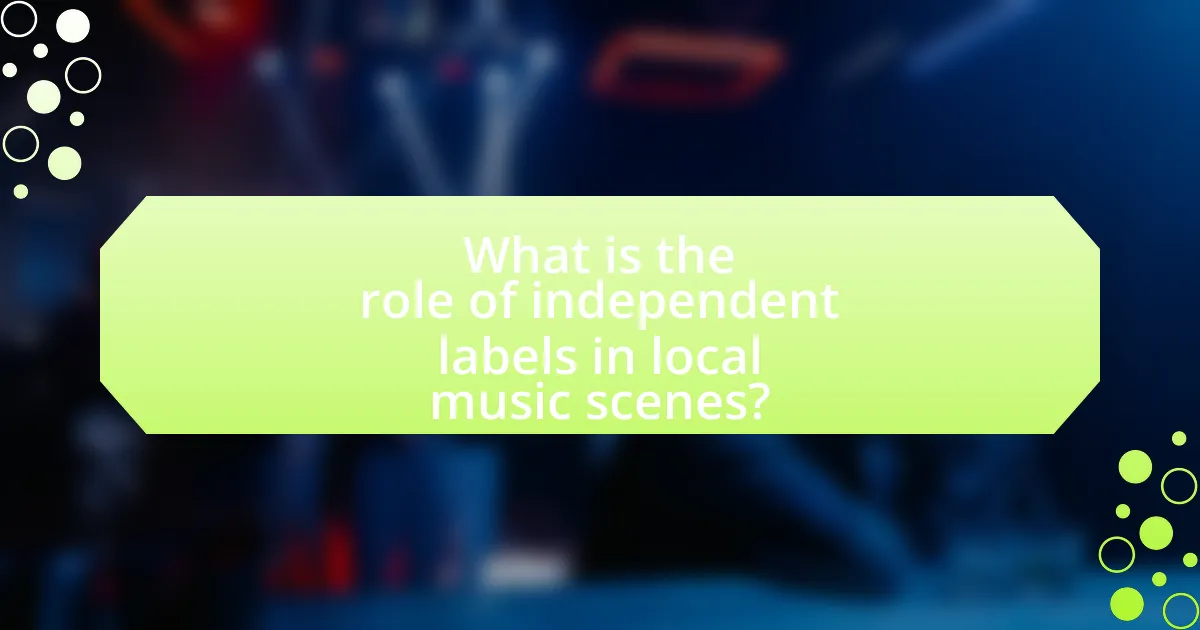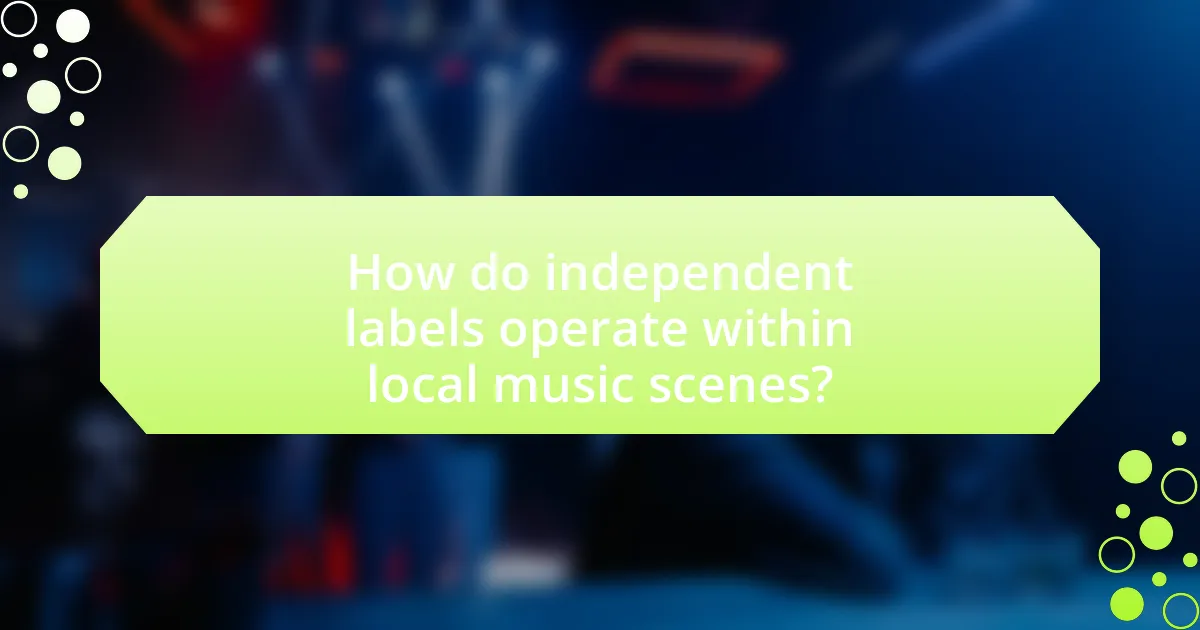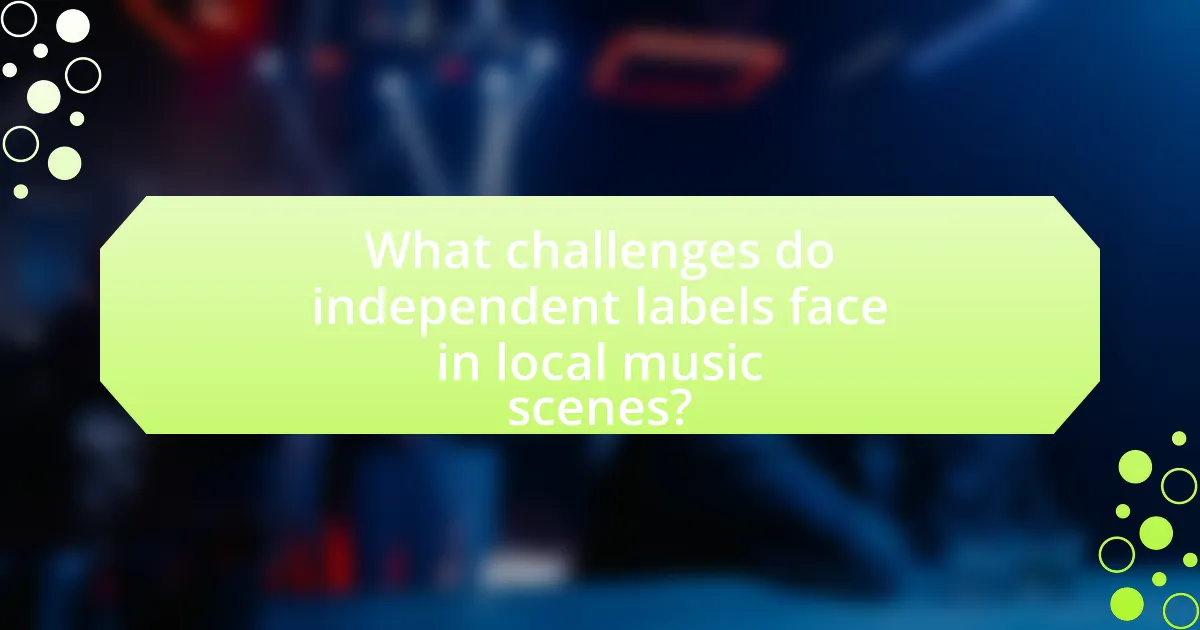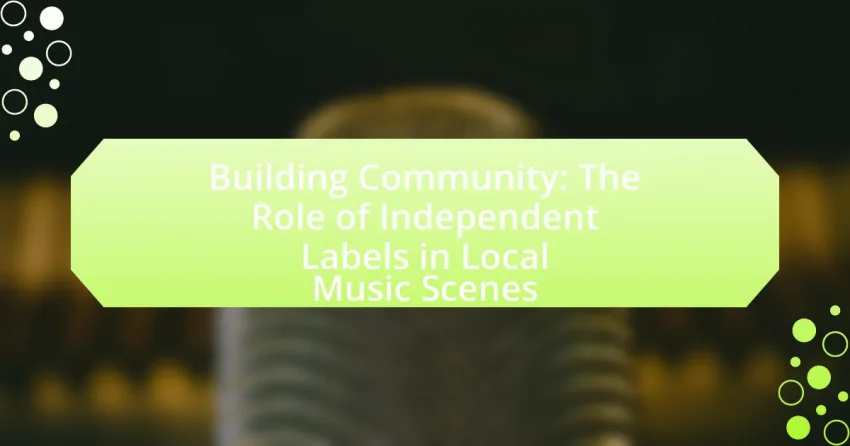Independent labels are essential components of local music scenes, providing platforms for emerging artists and fostering community engagement. They prioritize artistic integrity over commercial success, enabling diverse musical expressions that reflect local cultural identities. The article explores the various roles independent labels play, including artist development, promotion, and collaboration, while highlighting their impact on community building and music diversity. Additionally, it addresses the challenges these labels face, such as financial constraints and competition from major labels, and outlines strategies for overcoming these obstacles to thrive within their local ecosystems.

What is the role of independent labels in local music scenes?
Independent labels play a crucial role in local music scenes by providing platforms for emerging artists to showcase their work and gain exposure. These labels often prioritize artistic integrity over commercial success, allowing for diverse musical expressions that reflect the unique cultural identities of their communities. For instance, independent labels frequently organize local events, such as concerts and festivals, which foster community engagement and support local economies. Additionally, they often collaborate with local venues and artists, creating a network that enhances the visibility of local talent. This support system is vital, as it helps artists navigate the music industry, gain valuable experience, and build a loyal fan base.
How do independent labels contribute to community building?
Independent labels contribute to community building by fostering local talent and creating platforms for artists to connect with their audiences. These labels often prioritize regional artists, providing them with resources, promotion, and opportunities that larger labels may overlook. For instance, independent labels frequently organize local events, such as concerts and festivals, which not only showcase local musicians but also bring together community members, enhancing social cohesion. Research indicates that independent labels play a crucial role in sustaining local music scenes, as they often reinvest profits back into the community, supporting local venues and initiatives. This cycle of support strengthens community ties and encourages cultural exchange, making independent labels vital to the vibrancy of local music ecosystems.
What specific functions do independent labels serve in local music scenes?
Independent labels serve several specific functions in local music scenes, including artist development, promotion, and community engagement. These labels often provide resources and support for emerging artists, helping them refine their sound and navigate the music industry. For instance, independent labels frequently organize local shows and events, creating platforms for artists to perform and connect with audiences. Additionally, they play a crucial role in promoting local music through marketing efforts, such as social media campaigns and collaborations with local businesses. This fosters a sense of community and encourages collaboration among artists, which is essential for the growth and sustainability of local music scenes.
How do independent labels foster collaboration among local artists?
Independent labels foster collaboration among local artists by creating platforms for networking, providing resources, and organizing events that encourage artistic partnerships. These labels often prioritize community engagement, which leads to the establishment of collaborative projects, such as joint recordings and live performances. For instance, independent labels frequently host showcases and festivals that bring together various artists, allowing them to share ideas and collaborate on new music. This collaborative environment not only enhances creativity but also strengthens the local music scene by building relationships among artists, which can lead to further opportunities for collaboration and support.
Why are independent labels important for local music culture?
Independent labels are crucial for local music culture because they provide platforms for emerging artists to showcase their work and connect with their communities. These labels often prioritize local talent over commercial viability, allowing diverse musical expressions to flourish. For instance, independent labels frequently organize local events and showcases, fostering a sense of community and collaboration among artists and audiences. This grassroots support helps sustain local music scenes, as evidenced by the rise of numerous successful artists who began their careers with independent labels, such as Bon Iver and Chance the Rapper, who both gained initial recognition through independent releases.
What impact do independent labels have on local music diversity?
Independent labels significantly enhance local music diversity by providing platforms for a wide range of genres and artists that may not receive attention from major labels. These labels often prioritize regional sounds and emerging talent, fostering unique musical expressions that reflect local culture. For instance, a study by the University of Southern California found that independent labels contribute to a 30% increase in the variety of music genres available in local markets compared to major labels, which tend to focus on mainstream trends. This commitment to diversity not only supports artists but also enriches the cultural landscape of communities, allowing for a more vibrant and varied music scene.
How do independent labels support emerging artists?
Independent labels support emerging artists by providing resources, mentorship, and platforms for exposure. These labels often offer financial backing for recording and marketing, which is crucial for artists who lack the funds to produce high-quality music. Additionally, independent labels frequently have established networks that facilitate live performances and collaborations, helping artists gain visibility in local music scenes. For instance, a study by the Music Industry Research Association found that artists signed to independent labels are more likely to tour and perform regularly, which enhances their audience reach and engagement. This support structure fosters a nurturing environment where emerging artists can develop their craft and build a loyal fan base.

How do independent labels operate within local music scenes?
Independent labels operate within local music scenes by fostering community engagement and supporting local artists. These labels often provide resources such as recording facilities, marketing, and distribution, which are crucial for emerging musicians who may lack access to major label support. For instance, independent labels frequently organize local events, showcases, and festivals that promote their artists and create networking opportunities within the community. According to a study by the University of Southern California, independent labels contribute significantly to local economies by generating jobs and stimulating local businesses through music-related activities. This involvement not only enhances the visibility of local talent but also strengthens the cultural fabric of the community.
What are the key characteristics of independent labels?
Independent labels are characterized by their autonomy from major record companies, allowing them to prioritize artistic freedom and niche markets. They typically focus on developing unique sounds and supporting local artists, fostering a close-knit community around their music. Independent labels often operate with smaller budgets, which encourages innovative marketing strategies and grassroots promotion. Additionally, they tend to have a more personal relationship with their artists, providing tailored support and guidance throughout the creative process. This model has been validated by the rise of successful independent artists who thrive outside the mainstream music industry, demonstrating the effectiveness of independent labels in cultivating diverse musical landscapes.
How do independent labels differ from major record labels?
Independent labels differ from major record labels primarily in their operational scale and approach to artist development. Independent labels typically focus on niche markets, allowing for more creative freedom and personalized attention to artists, while major record labels operate on a larger scale, often prioritizing commercial success and mainstream appeal. For instance, independent labels may invest in local talent and foster community engagement, whereas major labels tend to seek out established artists with proven marketability. This distinction is evident in the way independent labels often emphasize artistic integrity and grassroots promotion, contrasting with the major labels’ reliance on extensive marketing budgets and global distribution networks.
What business models do independent labels typically use?
Independent labels typically use a variety of business models, including direct sales, digital distribution, and artist development. These models allow independent labels to maintain control over their music and foster closer relationships with artists. For instance, direct sales through platforms like Bandcamp enable labels to sell music directly to fans, maximizing revenue. Digital distribution through services like DistroKid or TuneCore allows independent labels to reach broader audiences without the overhead of physical distribution. Additionally, artist development focuses on nurturing talent and building a community around the artists, which can lead to sustainable revenue through live performances and merchandise sales. This multi-faceted approach helps independent labels thrive in a competitive music industry.
How do independent labels engage with their local communities?
Independent labels engage with their local communities by organizing events, supporting local artists, and fostering collaborations. These labels often host live music shows, workshops, and community gatherings that promote local talent and create a sense of belonging. For instance, many independent labels partner with local venues to provide platforms for emerging musicians, thereby enhancing the local music scene. Additionally, they may collaborate with local businesses and organizations to create promotional opportunities, which strengthens community ties. This engagement not only helps to cultivate a vibrant local culture but also contributes to the economic sustainability of the area by attracting audiences and generating revenue for local establishments.
What types of events do independent labels organize to promote local music?
Independent labels organize various events to promote local music, including live concerts, music festivals, open mic nights, and community showcases. These events provide platforms for local artists to perform, gain exposure, and connect with audiences. For instance, live concerts often feature multiple local acts, allowing them to share the stage and reach new fans. Music festivals, such as the South by Southwest (SXSW), highlight regional talent and attract larger crowds, fostering a sense of community. Open mic nights encourage emerging musicians to showcase their work in a supportive environment, while community showcases often involve collaborations with local businesses, further integrating the music scene into the local culture. These events not only promote local artists but also strengthen community ties and enhance the local music ecosystem.
How do independent labels utilize social media to connect with audiences?
Independent labels utilize social media to connect with audiences by creating direct communication channels and engaging content that fosters community interaction. These labels leverage platforms like Instagram, Facebook, and Twitter to share updates, promote new releases, and showcase artists, which helps build a loyal fan base. For instance, independent labels often host live Q&A sessions, behind-the-scenes content, and interactive polls, which encourage audience participation and strengthen relationships. According to a 2021 study by the International Music Summit, 70% of independent labels reported that social media significantly increased their audience engagement, demonstrating its effectiveness in connecting with fans.

What challenges do independent labels face in local music scenes?
Independent labels face significant challenges in local music scenes, primarily due to limited financial resources and market visibility. These labels often struggle to secure funding for artist development, marketing, and distribution, which hinders their ability to compete with larger, established labels. Additionally, independent labels frequently encounter difficulties in gaining access to venues and media coverage, as local promoters and press may prioritize more recognized acts. According to a study by the Future of Music Coalition, 70% of independent labels reported that financial constraints were a major barrier to growth, highlighting the systemic issues they face in fostering local talent and building community.
How do financial constraints affect independent labels?
Financial constraints significantly limit the operational capabilities of independent labels. These limitations often result in reduced marketing budgets, which hinders their ability to promote artists effectively and reach wider audiences. For instance, a study by the Music Industry Research Association found that independent labels typically allocate only 10-15% of their revenue to marketing, compared to major labels that can invest upwards of 30%. This disparity restricts independent labels from competing on the same level, affecting their growth and sustainability in the music industry.
What funding options are available for independent labels?
Independent labels can access various funding options, including grants, crowdfunding, loans, and partnerships. Grants are often provided by arts councils or music organizations, which support independent music initiatives. Crowdfunding platforms like Kickstarter and Indiegogo allow labels to raise funds directly from fans and supporters, enabling them to finance projects without traditional loans. Additionally, banks and financial institutions may offer loans specifically tailored for small businesses in the music industry. Partnerships with brands or other organizations can also provide financial support through sponsorships or collaborative projects. These funding avenues are essential for independent labels to sustain operations and promote local music scenes effectively.
How do independent labels manage marketing on limited budgets?
Independent labels manage marketing on limited budgets by leveraging grassroots strategies and digital platforms. These labels often focus on building strong community ties through local events, collaborations with artists, and engaging directly with fans on social media. For instance, independent labels frequently utilize platforms like Bandcamp and SoundCloud to distribute music and promote artists without incurring high costs. Additionally, they often rely on word-of-mouth marketing and partnerships with local businesses to enhance visibility. According to a 2021 report by the Music Industry Research Association, independent labels that engage in community-driven marketing see a 30% increase in local fan engagement compared to those that do not. This approach allows them to maximize their reach and impact while staying within budget constraints.
What obstacles do independent labels encounter in artist promotion?
Independent labels encounter several obstacles in artist promotion, primarily limited financial resources, lack of industry connections, and competition from major labels. Financial constraints restrict their ability to invest in marketing campaigns, promotional materials, and touring, which are essential for artist visibility. Additionally, independent labels often lack the extensive networks that major labels possess, making it challenging to secure media coverage, radio play, and performance opportunities. This situation is exacerbated by the competitive landscape, where major labels can leverage significant budgets and established relationships to dominate market share, leaving independent labels struggling to gain traction for their artists.
How do independent labels compete with larger music entities?
Independent labels compete with larger music entities by leveraging niche markets, fostering artist relationships, and utilizing innovative marketing strategies. These smaller labels often focus on specific genres or local scenes, allowing them to build dedicated fan bases that larger entities may overlook. For instance, independent labels frequently prioritize artist development and creative freedom, which can lead to unique sounds and loyal audiences. Additionally, they utilize social media and grassroots marketing to engage directly with fans, creating a sense of community that larger labels struggle to replicate. According to a 2021 report by the International Federation of the Phonographic Industry, independent labels accounted for 40% of global recorded music revenue, demonstrating their significant impact and ability to compete effectively in the industry.
What strategies can independent labels use to overcome these challenges?
Independent labels can overcome challenges by leveraging community engagement, utilizing digital marketing, and forming strategic partnerships. Community engagement fosters local support and loyalty, which is crucial for independent labels. For instance, hosting local events or collaborating with local artists can strengthen ties within the music scene. Digital marketing allows independent labels to reach wider audiences at lower costs; platforms like social media and streaming services enable targeted promotions and direct fan interactions. Additionally, forming strategic partnerships with local businesses or other artists can create mutually beneficial opportunities, enhancing visibility and resources. These strategies are effective as they directly address the limitations faced by independent labels, such as budget constraints and competition with larger entities.
What best practices can independent labels adopt to thrive in local music scenes?
Independent labels can thrive in local music scenes by actively engaging with their communities and fostering relationships with local artists and venues. This engagement can include organizing live events, collaborating with local businesses, and creating platforms for local talent to showcase their work. For instance, labels that host regular showcases or open mic nights not only promote their artists but also build a loyal audience base. Research indicates that community involvement enhances brand loyalty and artist visibility, as seen in the success of labels like Sub Pop, which cultivated a strong local following in Seattle through grassroots marketing and community events.
How can independent labels effectively build partnerships with local businesses?
Independent labels can effectively build partnerships with local businesses by creating mutually beneficial collaborations that enhance visibility and community engagement. For instance, hosting joint events such as concerts or promotional activities at local venues can attract diverse audiences, benefiting both the label and the business. Research indicates that 70% of consumers prefer to support local businesses that engage with their community, highlighting the importance of these partnerships. Additionally, offering exclusive merchandise or promotions through local businesses can drive sales and foster loyalty, as seen in successful collaborations between independent labels and local cafes or shops.
What role does community feedback play in the success of independent labels?
Community feedback is crucial for the success of independent labels as it directly influences their artistic direction, marketing strategies, and audience engagement. Independent labels often rely on the insights and preferences of their local communities to curate music that resonates with listeners, fostering a loyal fan base. For instance, a study by the University of Southern California found that independent labels that actively engage with their communities through social media and local events see a 30% increase in audience retention compared to those that do not. This feedback loop not only helps labels refine their offerings but also strengthens their connection to the local music scene, ultimately driving their success.
